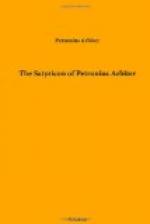But finding it difficult to wean my self from the love of revenge, I spent half the night very pensively; and rising by day-break, to ease me of my grief, and thoughts of my injury, I rov’d about every where, till at last going in to a publick gallery, very wonderful for several sorts of excellent painting; I saw some by Zeuxy’s hand, that had not yet yielded to the injuries of time: And, not without an awful reverence, behold others by Protogenes, which tho’ they were first tryals, yet disputed for exactness, even with nature it self: but on the other side viewing a celebrated piece drawn by Apelles; I even ador’d the work of so great a master: ’twas so correctly finisht to the life, you’d have sworn it an image of the soul too. One side gave the story of the eagle bearing Jupiter to heaven, the other the fair Hylas repelling the addresses of the lew’d naiad: in another part was Apollo, angry at himself for killing his boy Hyacinth; and, to shew his love, crown’d his harp with the flower that sprung from his blood.
In this gallery, as in a vision of living images, I cry’d out; and are not the gods themselves secure from love? Jupiter in his seraglio above, not finding one that can please his appetite, sins upon earth, yet injures nobody: the nymph wou’d have stifl’d her passion for Hylas, had she believ’d the lusty Hercules wou’d have been his rival: Apollo turns Hyacinth into a flower: and every image enjoy’d its wishes without a rival: but I have caress’d, as the dearest friend, the greatest villain.
While I was thus talking to my self, there enter’d the gallery an old man, with a face as pale as age had made his hair; and seem’d, I know not how, to bring with him the air of a great soul; but viewing his habit, I was easily confirm’d in my opinion, since fortune seldom deals favourably with learned men. In short, he made up to me, and addressing himself, told me he was a poet; and, as he hop’d, above the common herd: if, added he, my merrit don’t suffer by applause that’s promiscuously given, to the good and bad.
Why, therefore, interrupted I, are you so meanly clad? On this account return’d he, because learning never made any man rich.
The merchant’s profit
well rewards his toil:
The souldier crowns his labours
with the spoil:
To servile flattery we altars
raise:
And the kind wife her stallion
ever pays:
But starving wit in rags takes
barren pain:
And, dying, seeks the muses
aid in vain.
“’Tis certain,” added he, “that a lover of virtue, on account of his singularity, meets with contempt; for who can approve what differs from himself? And that those who admire riches, wou’d fain possess every body, that nothing is more reasonable than their opinion; whence they ridicule, as well as they can, the learned few; that they, like themselves, might seem within the power of money.”
“I don’t know, how learning and poverty became relations,” said I, and sigh’d: “You justly lament,” return’d he, “the condition of scholars.”




